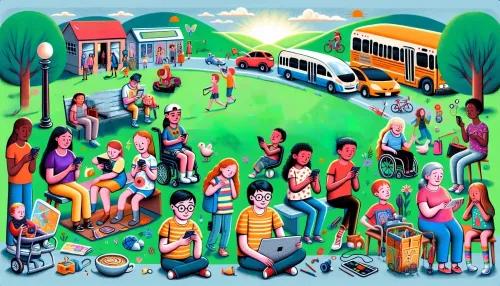
Shaping Perceptions: Understanding Autism’s Impact on Self-Identity and Social Integration

Autism is a complex neurodevelopmental condition that affects how individuals perceive the world and interact with others. For autistic children, understanding their self-identity and integrating into social environments can pose unique challenges. In this article, we delve into the intricacies of self-perception, societal influence, and strategies for fostering meaningful social connections for autistic children.
Self-Perception in Autism: Constructing a Positive Identity Amidst Neurodiversity
Understanding self-perception in autism is pivotal to supporting positive identity construction. Autistic children often experience internal conflicts as they navigate their distinct cognitive and sensory experiences. It is crucial to recognize that their self-identity may differ from neurotypical peers. As we emphasize the importance of validating individual experiences within the neurodiverse spectrum.
Embracing Neurodiversity: Redefining Self-Identity
As we advocate for embracing neurodiversity as a fundamental aspect of self-perception in autistic children. By acknowledging diverse cognitive processes and sensory sensitivities, we empower autistic individuals to construct positive self-identities. This approach fosters self-acceptance and resilience, nurturing a sense of belonging within their unique neurological framework.
Empowerment through Self-Expression
Encouraging self-expression is pivotal in shaping positive self-perceptions among autistic children. It's essential to recognize the significance of providing platforms for creative expression, whether through art, music, or other forms of communication. By amplifying their voices and validating their modes of expression, we promote a culture of empowerment and self-affirmation.
The Social Mirror: How Peers and Society Influence Autistic Self-Concept
The influence of peers and society on autistic self-concept cannot be understated. Social interactions play a critical role in shaping the perceptions and self-esteem of autistic children. HorizonsMind underscores the need for inclusive environments that celebrate diversity while fostering empathy and understanding.
Navigating Social Dynamics: Impact on Self-Esteem
The societal perception of autism significantly impacts how autistic children view themselves. Negative stereotypes and stigmatization can erode their self-esteem and hinder social integration. As we advocate for educating peers and communities about autism, promoting acceptance, and dispelling misconceptions to create inclusive spaces where autistic individuals feel valued and understood.
Cultivating Positive Peer Relationships
Facilitating positive peer relationships is essential for nurturing healthy self-concepts in autistic children. Emphasizing the role of structured social activities that provide opportunities for meaningful connections. By fostering empathy, communication skills, and mutual respect, we aim to cultivate environments where autistic children can develop authentic friendships based on acceptance and understanding.
Building Blocks of Belonging: Strategies for Developing Robust Social Networks
Building robust social networks is instrumental in supporting the social integration of autistic children. Recognizing the importance of equipping them with effective strategies to navigate social environments and cultivate meaningful connections.
Strength-Based Approaches to Socialization
HorizonsMind advocates for a strength-based approach to socialization, focusing on identifying and nurturing the unique strengths of autistic children. By harnessing their interests and talents, we empower them to engage in activities that align with their preferences, consequently fostering genuine connections and a sense of belonging within social settings.
Structured Social Skill Development
Structured social skill development programs play a pivotal role in empowering autistic children to navigate social interactions with confidence. Emphasizing the value of tailored interventions aimed at enhancing communication, perspective-taking, and emotional regulation. These targeted strategies equip them with the tools necessary to forge meaningful relationships while embracing their individuality.
From Isolation to Inclusion: Changing Narratives Around Autism and Social Participation
Transitioning from isolation to inclusion requires a paradigm shift in how autism is perceived within society. As we advocate for reshaping narratives surrounding autism, emphasizing inclusion, accessibility, and celebrating the diverse strengths that autistic individuals bring to social spaces.
Promoting Inclusive Environments
Creating inclusive environments entails proactive efforts to accommodate diverse needs within social settings. HorizonsMind emphasizes the significance of promoting sensory-friendly spaces, fostering understanding of varied communication styles, and advocating for accessible activities that cater to the diverse interests of autistic children. By dismantling barriers to inclusion, we pave the way for genuine participation and engagement.
Advocacy for Acceptance and Understanding
Advocacy plays a pivotal role in reshaping societal attitudes toward autism. As our prioritizes initiatives that promote acceptance, understanding, and awareness of neurodiversity. By amplifying voices within the autism community and advocating for inclusive policies, we strive to foster an environment where autistic children are embraced for their unique contributions while being afforded equitable opportunities for social participation.
In conclusion, understanding autism's impact on self-identity and social integration is paramount in creating supportive environments for autistic children. By embracing neurodiversity, reshaping societal perceptions, fostering robust social networks, and advocating for inclusion, HorizonsMind aims to empower autistic individuals to thrive within diverse social landscapes.
Check Out These Related Articles


Nurturing Support Networks: Building Stronger Community Structures for Autistic Children

The Role of TikTok in Shaping Autism Advocacy and Awareness Among Gen Z
